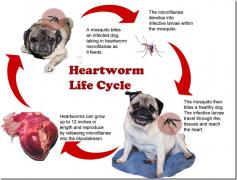Canine Heartworm Update

Canine Heartworm Update
Last week I was a guest on Dr. Frank Adams’ monthly pet show on NYU Langone Medical Center’s “Dr. Radio.” One of the callers asked if heartworm preventative was really necessary in her dogs. She thought (incorrectly) that since she lived in an area where mosquitoes are uncommon, her dogs would be safe against heartworm infection. My answer to her was a resounding “yes” and I added, “Give those pills exactly on time.”
Treatment versus prevention
No dog owner would ever miss a dose of heartworm preventative if they knew how difficult and dangerous treating heartworms can be. When a diagnosis of heartworm disease is made, any signs of heart failure must be immediately controlled. After your dog’s heart has been stabilized, veterinarians then administer a drug by injection to kill the adult heartworms. Strict cage rest is instituted to minimize the risk of blood clots which may form in the lungs as a result of dying heartworms. Cage rest continues for at least a month after adult heartworm treatment. Protocols for the treatment of adult heartworms are 90-98% successful and if unsuccessful, your dog will need to be treated a second time. Throughout treatment for adult worms, your dog must be maintained on heartworm preventative in case of another bite by an infected mosquito.
Heartworm review
Mosquitoes transmit heartworms. A bite from an infected mosquito injects heartworm larvae into your dog’s blood stream. Heartworm preventative kills the larvae before they mature. If unchecked by heartworm preventative, the larvae mature in the large blood vessels of the heart and lungs, leading to severe heart and lung compromise.
CAPC changes heartworm recommendations
Last month, the Companion Animal Parasite Council revised its guidelines regarding canine heartworm disease. Council members cited new evidence of resistance of heartworms from the Mississippi Delta region to heartworm preventatives, specifically ivermectin, selamectin, moxidectin and milbemycin oxime, confirming years of speculation about resistance in the veterinary community. At this time, it is not known how widespread heartworm resistance is, but it makes an annual heartworm test even more important than before.
Heartworm prevention tips
- Year round administration of heartworm medication gives the best protection against heartworms.
- Giving heartworm medication precisely on time is critical to successful prevention.
- Place the stickers from the heartworm preventative medication on your calendar to remind you to give the monthly heartworm preventative.
- Sign up for email or text message reminders on your smartphone from the website of your heartworm preventative manufacturer.
- Get the reminder app from the website of your heartworm preventative manufacturer.
- Mosquitoes are most active at dawn and dusk. Keep your dog indoors during peak mosquito activity.
- Ask your veterinarian about monthly flea and tick medications that also repel mosquitoes.

































